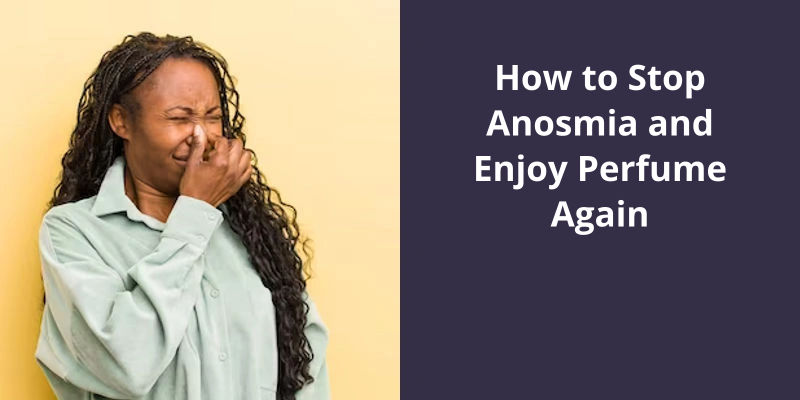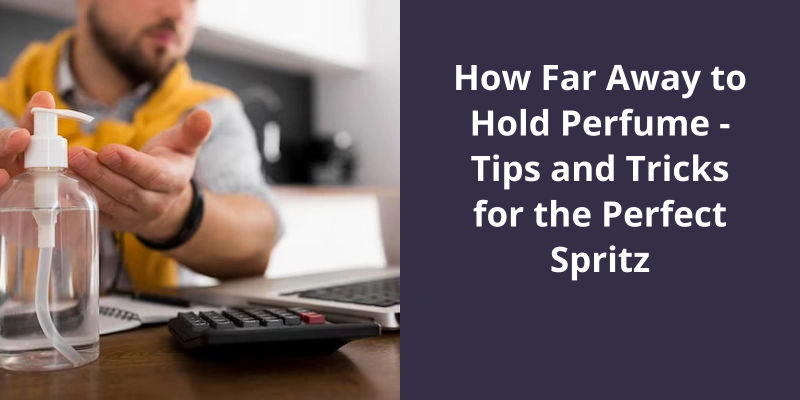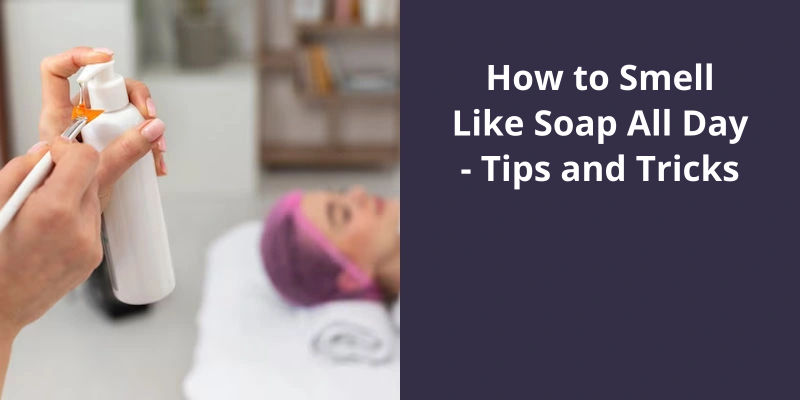To combat anosmia and start enjoying perfumes again, it’s crucial to first understand the root cause of the condition because it could stem from problems like nasal obstruction or nerve damage. If it arises from blockage like congestion or polyps, using a saline solution to clear your nose or using prescribed nasal sprays can be beneficial. For more severe issues like nerve damage, it’s recommended to seek medical treatment. Incorporating smell training can also help, which involves regularly smelling a selection of strong, distinct scents to stimulate your sense receptors. Finally, managing your overall health through proper diet, refraining from smoking, and getting regular exercise can also aid your sense of smell. However, remember that while you can take these steps, the guidance of a healthcare professional is essential to effectively manage and treat anosmia.

Why Am I Anosmic to Certain Perfumes?
There are various factors that can contribute to anosmia, or the loss of sense of smell. One of the most common is exposure to chemicals that damage the olfactory receptors in the nose. This can occur through environmental pollutants, such as smoke and pesticides, or through the use of certain medications. Additionally, head injuries, sinus infections, and aging can all contribute to anosmia.
When it comes to perfumes, it’s important to note that everyones sense of smell is different. Some people are more sensitive to certain scents, while others may not be able to detect them at all. This is due to a complex interplay between genetics and environmental factors, such as exposure to different smells throughout our lives.
If you find that you’re anosmic to a particular perfume, it may be helpful to take a break from using it for a period of time. This will allow your nose to recover from the overexposure and regain it’s sensitivity to the scent. Additionally, you may want to try switching to a different fragrance with a different smell profile. This can help to keep your sense of smell engaged and prevent desensitization.
It’s also worth noting that some people may be anosmic to certain synthetic fragrance ingredients. This can be due to an allergy or sensitivity to the chemical compounds used to create the scent. If you suspect that this may be the case for you, it’s important to consult with a medical professional or fragrance specialist to determine the best course of action.
The Science Behind How Our Sense of Smell Works
Our sense of smell works through our olfactory system which is composed of specialized cells that detect odor molecules in the air. These cells are located in the upper part of the nasal cavity and send signals to the brain to interpret the scent. The brain uses this information to identify different smells and create emotional responses to them. The olfactory system is known for it’s extreme sensitivity and ability to detect thousands of different smells.
It’s important to strike the right balance with your perfume, as overdoing it can lead to an overwhelming aroma. Fortunately, there are plenty of ways to avoid smelling too much like your favorite fragrance. A quick and easy solution involves a cotton ball and rubbing alcohol, but there are other options available as well. If you’re interested in moderating your scent, keep reading to learn more.
How Do You Not Smell Too Much Perfume?
We all want to smell good and have a signature scent that reflects our personality and style. However, sometimes we can go overboard with the perfume application, leading to a scent that’s too strong and overpowering. Not only can this be unpleasant for those around us, but it can also be a headache-inducing experience for ourselves. So, how can we avoid smelling too much perfume?
One of the easiest and most effective ways to tone down a scent is to use rubbing alcohol. This common household item can be found at most drugstores and is an inexpensive solution for those who’ve applied too much perfume. To use this method, simply dip a cotton ball in rubbing alcohol and dab it on the areas where you applied too much perfume. This will help to neutralize the scent and make it more subtle.
Another option for those who want to tone down a scent is to use non-scented lotion. This method is particularly useful for those who’ve sensitive skin or allergies to certain scents.
For those who’re on the go and don’t have access to rubbing alcohol or lotion, baby wipes can be a quick fix. Baby wipes are gentle on the skin and can help to remove excess perfume.
It’s also important to consider the type of perfume you’re using. Certain fragrances are more potent than others, and it’s important to choose a scent that’s appropriate for the occasion and setting. For example, a strong, musky scent may be more appropriate for a night out than a work function.
Finally, it’s important to be mindful of how much perfume you’re applying in the first place. A little goes a long way, and it’s better to err on the side of caution when applying fragrance. Start with a small amount, and build up if necessary. By being mindful of how much perfume you’re applying and using these tips to tone down a scent if necessary, you can ensure that you always smell great without overwhelming those around you.
The Science Behind Perfume and How It Interacts With Our Sense of Smell
Perfume is a blend of fragrant essential oils and other aroma compounds that are designed to stimulate our sense of smell. Our sense of smell is complex, and it’s linked to our brain in a way that allows us to experience emotions and memories. The aroma compounds in perfume interact with the olfactory receptors in our nose, sending signals to our brain which then translates these signals into a scent. The composition of perfume, including the type and amount of aroma compounds used, can have a significant impact on the way it’s perceived by different people. Understanding the science behind perfume is key to creating fragrances that are both pleasing and effective.
As our bodies age and undergo changes, we may become more susceptible to different allergies or sensitivities. For many, this includes suddenly becoming sensitive to perfume or fragrance. Though it may seem like a nuisance, it’s important to recognize the signs of an allergy and take necessary precautions to ensure your health and wellbeing.
Why Am I Suddenly Sensitive to Perfume?
However, it’s not just those with pre-existing conditions that are at risk. Our immune systems can change over time, which means that just because you havent had a reaction before, doesn’t mean you won’t in the future. Environmental factors such as increased exposure to pollutants, poor diet, lack of exercise, and stress can all contribute to weakened immune systems.
Allergies are caused by an over-reaction of the immune system to a normally harmless substance. When our body comes into contact with an allergen, such as perfume, it produces antibodies that attach to mast cells. The next time you come into contact with the same allergen, the antibodies signal the mast cells to release histamine, which leads to symptoms such as itching, swelling, and difficulty breathing.
Perfume sensitivity can be a frustrating and challenging condition to manage. Avoiding exposure to perfume is the most effective way to prevent symptoms, but this can be challenging in a world where fragrances are in everything from personal care products to cleaning supplies. Identifying and eliminating the specific fragrances that trigger your symptoms can be helpful, but this requires time and effort.
Using fragrance-free products, keeping windows open for ventilation, and wearing a mask in situations where you may be exposed to perfume can all be helpful. It’s also important to communicate your needs to friends, family, and coworkers to ensure they understand and can accommodate your needs.
Understanding the Chemical Components of Perfume and How They Can Affect the Body
- Alcohol
- Fragrance oils
- Water
- Fixatives
- Solvents
- Preservatives
- Emulsifiers
- Aromatic compounds
- Essential oils
Source: Perfume Allergy NY Allergy & Sinus Centers
While many people enjoy the pleasant scent of perfume or cologne, others may experience negative side effects. In addition to mild symptoms like headaches and watery eyes, those with allergies may also experience more severe symptoms like dizziness and difficulty breathing. In this article, we’ll take a closer look at why these reactions occur and what you can do to prevent them.
Why Do I Get Dizzy When I Smell Perfume?
The chemicals used in perfumes and colognes can trigger allergic reactions and cause the body to have a histamine response. This can lead to a range of symptoms, including dizziness. Some people may also experience nausea or a feeling of lightheadedness when exposed to these fragrances.
It’s important to note that not all perfumes and colognes will have the same effect on everyone. Some people may be more sensitive to certain chemicals or fragrances than others, which could impact their reaction to different types of scents. In some cases, an individual may be able to tolerate certain fragrances at low levels, but experience symptoms when exposed to higher concentrations.
As you spritz on your favorite fragrance day in and day out, you start to wonder why it seems like you can no longer smell it. Don’t worry, this doesn’t mean that your sense of smell is damaged or that your perfume has gone bad. In fact, it’s a common phenomenon called nose fatigue or olfactory adaptation that happens when our nose and brain work together to identify smells. So, sit back and discover the science behind why you can’t smell your own perfume.
Why Can Others Smell My Perfume but I Can T?
When you inhale, molecules from the perfume enter your nose and bind to specific receptors. These receptors send signals to the brain, which is responsible for processing and interpreting the odor. However, when you’re exposed to the same scent for a prolonged period, the receptors become overstimulated and less sensitive to the odor. This leads to a decrease in signal transmission to the brain, resulting in a diminished sense of smell.
Interestingly, nose fatigue doesn’t just happen with perfumes and scents. It can also happen with other stimuli, such as noise and taste. For example, if you listen to a song on repeat for hours, you may eventually stop hearing certain parts of it. Likewise, if you eat the same food every day, the taste may start to become less pronounced over time.
So, why can others smell your perfume when you cant? The answer is simple: They havent been exposed to it for as long as you have. When you apply perfume, your nose quickly adapts to the scent and eventually stops registering it. However, someone who walks by you and catches a whiff of your perfume is experiencing it for the first time. Their receptors are still sensitive to the odor, so they can detect it more easily than you can.
It’s worth noting that nose fatigue isnt permanent. If you take a break from the scent for a few hours, your receptors will recover, and youll be able to smell the perfume again. In fact, this is why many perfumers recommend taking a break from a fragrance for a day or two before deciding if you like it or not.
It’s not a cause for concern and doesn’t mean that theres anything wrong with your sense of smell. So, next time someone compliments your perfume but you cant smell it, don’t worry – it’s just your nose taking a break.
Conclusion
While it may feel like a permanent situation, it's important to remember that there are steps you can take to potentially reverse the effects. Removing the scent in question from your daily routine and avoiding similar fragrances for a period of time may give your nose a chance to reset and start detecting the scent again. It's important to be patient and persistent in trying different methods until you find the solution that works best for you. Remember, anosmia may not be forever, and there’s hope for enjoying scents once again.





